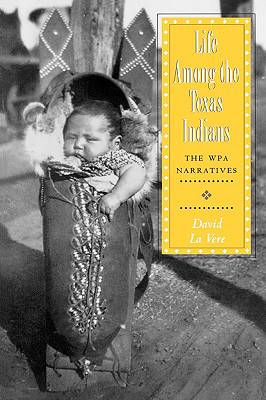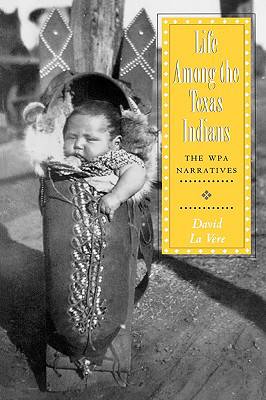
- Retrait gratuit dans votre magasin Club
- 7.000.000 titres dans notre catalogue
- Payer en toute sécurité
- Toujours un magasin près de chez vous
- Retrait gratuit dans votre magasin Club
- 7.000.000 titres dans notre catalogue
- Payer en toute sécurité
- Toujours un magasin près de chez vous
Description
Historian David La Vere has culled from the Indian-Pioneer Histories housed in the Indian Archives of the Oklahoma Historical Society in Oklahoma City a wealth of vivid detail about life among the former Texas Indian peoples. The oral histories that make up this collection were gathered during the Great Depression by the Works Progress Administration. From the 112 bound volumes that resulted, Dr. La Vere has gathered all the material pertinent to the Indians who came from Texas into an exceptional picture of the details of daily life-war and raiding, hunting and planting, foodways dress, parties and spiritual practices, education, health, and housing. La Vere has edited the narratives to group excerpts topically. Under farming, for example, he gives this report from a Wichita man: "We raise corn, pumpkin, sweet potato. I don't know where we got corn, probably given to my people four hundred years ago. Other Indians didn't know how to work, to raise corn and pumpkins. They would have to get this from Wichitas." A Caddo woman describes in great detail the three general styles of dress for Caddo women, and a Caddo-Delaware woman tells about the different woods and dyes used in making baskets. A white man living in Comanche Territory details how the Comanches tanned hides by "working the [animal's] brains over them." Children's games and adults' dance rituals all are described in the words of those who played, danced, and watched them. La Vere sets the stage for this ethnographic detail with a lively, readable history of the succession of peoples who lived in Texas from the Paleo-Indians until the present. It is a clear overview of the basic social structures of the tribes and the relations among tribes and, later, of the Indians with the Europeans who came to the region. Accompanied by dramatic and poignant photographs from Oklahoma archives, the gift that comes through these pages is an immediacy of observation and impression that re-inspires the historical imagination about life among the first Texans. DAVID LA VERE is an assistant professor of history at the University of North Carolina at Wilmington. He has published a previous book on the Caddo Indians. His Ph.D. is from Texas A&M University.
Spécifications
Parties prenantes
- Auteur(s) :
- Editeur:
Contenu
- Nombre de pages :
- 290
- Langue:
- Anglais
- Collection :
- Tome:
- n° 18
Caractéristiques
- EAN:
- 9781585445288
- Date de parution :
- 01-02-10
- Format:
- Livre broché
- Format numérique:
- Trade paperback (VS)
- Dimensions :
- 154 mm x 230 mm
- Poids :
- 426 g







